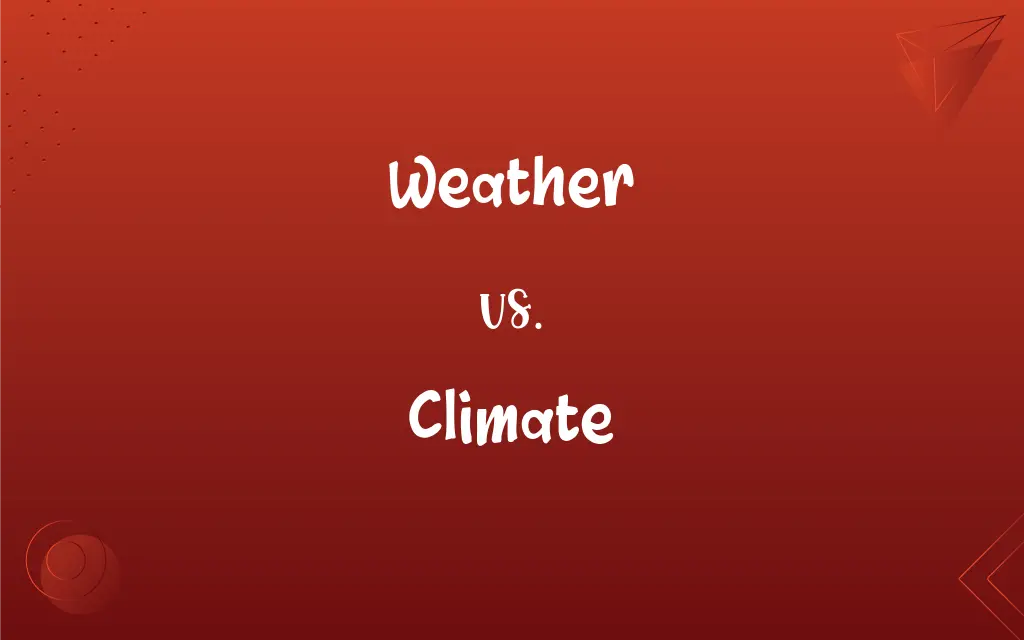Weather vs. Climate: What's the Difference?
Edited by Janet White || By Harlon Moss || Updated on October 17, 2023
Weather refers to short-term atmospheric conditions; climate denotes long-term patterns and averages.

Key Differences
Weather and climate are terms frequently used in meteorological contexts, but they serve different purposes. Weather refers to the day-to-day atmospheric conditions, such as temperature, humidity, and precipitation, in a particular region. In contrast, climate pertains to the long-term average of these conditions over decades to centuries.
The immediate conditions you experience outside on a given day describe the weather. This includes temporary phenomena like rainstorms, sunny spells, and cold fronts. On the other hand, climate provides a broader perspective, encapsulating the long-term patterns and expectations of weather in a region, whether it's tropical, arid, or temperate.
Understanding the distinction between weather and climate is essential for various fields, especially agriculture, urban planning, and environmental studies. While weather can dictate what you wear on a particular day, climate influences the type of vegetation that thrives in an area, how buildings are constructed, and the way communities are planned.
Meteorologists and climatologists both study aspects of Earth's atmosphere, but their focus varies. Meteorologists tend to concentrate on predicting short-term weather changes using current atmospheric data. In contrast, climatologists analyze long-term data trends to understand and predict shifts in regional and global climates.
Importantly, while weather can be volatile and unpredictable in the short term, climate offers a more stable and predictable view of a region's typical atmospheric conditions over longer periods. This is why unexpected weather events don't necessarily contradict established climate patterns.
ADVERTISEMENT
Comparison Chart
Time Frame
Short-term (hours to days)
Long-term (decades to centuries)
Definition
Daily atmospheric conditions
Long-term average of weather patterns
Predictability
Can be volatile and variable
Relatively stable over long periods
Factors
Temperature, humidity, etc.
Average temperature, humidity, rainfall, etc.
Study
Focused on short-term forecasts
Analyzes and predicts long-term regional patterns
ADVERTISEMENT
Weather and Climate Definitions
Weather
Weather can be variable and unpredictable.
The weather changed quickly, leading to a sudden downpour.
Climate
Climate encompasses expected patterns and behaviors.
The Mediterranean region has a climate characterized by wet winters and dry summers.
Weather
Weather is the daily state of the atmosphere.
The weather today is sunny and warm.
Climate
Climate is the average weather in a region over long periods.
The climate of the Sahara is predominantly hot and dry.
Weather
Weather includes temporary phenomena like rain and snow.
The weather forecast predicts snow tomorrow.
Climate
Climate offers a broader view than daily weather.
While the weather may vary, the tropical climate remains consistent.
Weather
Weather affects daily decisions like attire and activities.
Due to the rainy weather, the game was postponed.
Climate
Climate classifications include tropical, arid, and temperate.
Canada's northern regions have a polar climate.
Weather
Weather is forecasted using current atmospheric data.
Meteorologists use advanced tools to predict the weather.
Climate
Climate is studied to understand regional characteristics.
Researchers analyze the climate to inform agricultural practices.
Weather
The state of the atmosphere at a given time and place, with respect to variables such as temperature, moisture, wind velocity, and barometric pressure.
Climate
The meteorological conditions, including temperature, precipitation, and wind, that characteristically prevail in a particular region.
Weather
Adverse or destructive atmospheric conditions, such as high winds or heavy rain
Encountered weather five miles out to sea.
Climate
A region of the earth having particular meteorological conditions
Lives in a cold climate.
FAQs
Can weather be unpredictable?
Yes, weather can be volatile and vary from day to day.
Who studies weather?
Meteorologists study and predict weather patterns.
Does climate change frequently?
Climate represents long-term patterns and typically remains relatively stable over longer periods.
Why is understanding climate important?
Climate knowledge informs agriculture, construction, and urban planning.
Can a region's climate be categorized?
Yes, climates are classified into types like tropical, arid, and temperate.
How does weather impact daily life?
Weather affects daily decisions like what to wear, outdoor activities, and travel plans.
Why can't daily weather be used to judge climate?
Daily weather is short-term, while climate reflects long-term averages and patterns.
Is weather only about temperature?
No, weather encompasses various conditions like humidity, precipitation, and wind.
Who focuses on climate?
Climatologists analyze long-term weather data to understand climate patterns.
Are weather and climate connected?
Yes, climate is the long-term average of weather patterns in a region.
Does climate change affect global weather patterns?
Yes, changes in climate can influence the frequency and intensity of weather events globally.
Can understanding climate help in disaster preparedness?
Yes, knowing a region's climate can aid in anticipating and preparing for certain natural events.
What does weather refer to?
Weather refers to the short-term atmospheric conditions in a region.
Can climate influence local flora and fauna?
Absolutely, climate dictates which plants and animals thrive in a particular region.
Is weather more variable than climate?
Yes, weather can change frequently, while climate is a more consistent long-term pattern.
How is climate defined?
Climate denotes the long-term average weather patterns in a particular area.
Does a rainy day mean a region's climate is changing?
No, a single weather event doesn't necessarily indicate a change in climate.
How are weather forecasts made?
Meteorologists use atmospheric data and tools to predict short-term weather changes.
How long is the timeframe for climate studies?
Climate studies look at data over decades to centuries.
Can two places have similar climates but different weather?
Yes, places with similar climates can experience different daily weather events.
About Author
Written by
Harlon MossHarlon is a seasoned quality moderator and accomplished content writer for Difference Wiki. An alumnus of the prestigious University of California, he earned his degree in Computer Science. Leveraging his academic background, Harlon brings a meticulous and informed perspective to his work, ensuring content accuracy and excellence.
Edited by
Janet WhiteJanet White has been an esteemed writer and blogger for Difference Wiki. Holding a Master's degree in Science and Medical Journalism from the prestigious Boston University, she has consistently demonstrated her expertise and passion for her field. When she's not immersed in her work, Janet relishes her time exercising, delving into a good book, and cherishing moments with friends and family.































































